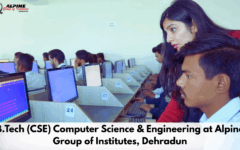Skills You Will Master with a Bachelor of Technology in Computer Science Engineering: Unlock Your Tech Potential
2025-04-03 9:17Skills You Will Master with a Bachelor of Technology in Computer Science Engineering: Unlock Your Tech Potential

Skills You Will Master with a Bachelor of Technology in Computer Science Engineering: Unlock Your Tech Potential
Find the essential skills you will master with a Bachelor of Technology in Computer Science Engineering. Learn about programming, problem-solving, software development, and more.
A Bachelor of Technology (B.Tech) in Computer Science Engineering (CSE) equips students with a broad set of skills that are highly valued in the technology industry. Whether you’re interested in software development, data science, cybersecurity, or artificial intelligence, this degree provides the foundation necessary to excel in these fields.
1. Programming Languages: The Core Skill of CSE
One of the first and most important skills you’ll develop during your B.Tech in CSE is proficiency in various programming languages. Programming is the backbone of computer science and technology, and understanding how to write, debug, and optimize code is essential for any tech career.
- Languages You’ll Learn:
- C: Often considered the foundational language for computer science.
- Java: Widely used in software development and enterprise applications.
- Python: Popular for machine learning, data science, and automation.
- C++: Key for performance-critical applications and systems programming.
- JavaScript: Used for web development and front-end design.
- C: Often considered the foundational language for computer science.
Mastering these languages will allow you to develop software applications, websites, and even work with emerging technologies like AI and blockchain.
2. Problem-Solving and Logical Thinking
In computer science, problem-solving is not just a skill; it’s a mindset. Throughout your B.Tech in CSE, you’ll be trained to approach complex issues with a structured, logical approach. From algorithm design to debugging code, problem-solving is essential in virtually every task you’ll face.
- Key Concepts:
- Algorithms: Understanding how to create efficient algorithms for various tasks like sorting, searching, and optimization.
- Data Structures: Learning how to organize and store data efficiently, using structures like arrays, linked lists, stacks, and queues.
- Complexity Analysis: Mastering Big O notation to evaluate the efficiency of algorithms.
- Algorithms: Understanding how to create efficient algorithms for various tasks like sorting, searching, and optimization.
Developing strong problem-solving abilities will not only help you code better but will also improve your analytical skills, making you a valuable asset in fields like software engineering and data science.
3. Software Development Lifecycle: From Planning to Deployment
With a B.Tech in CSE, you’ll gain a deep understanding of the software development lifecycle (SDLC), which involves all the steps required to build, deploy, and maintain software applications. This knowledge will help you build reliable and scalable software products.
- Phases of SDLC:
- Planning: Requirements gathering and system design.
- Development: Writing code and implementing features.
- Testing: Ensuring the software works correctly and fixing bugs.
- Deployment: Releasing the software to users.
- Maintenance: Ongoing updates and fixing new issues.
- Planning: Requirements gathering and system design.
Understanding this process is crucial if you want to work as a software developer, quality assurance (QA) engineer, or even in project management within tech teams.
4. Data Management and Database Systems
Another essential skill you’ll develop is data management, including understanding how to organize, retrieve, and manipulate data efficiently. A B.Tech in CSE includes extensive coursework in databases and data management techniques, enabling you to work with structured and unstructured data.
- Key Topics:
- Relational Databases: Mastering SQL and designing efficient database schemas.
- NoSQL Databases: Understanding non-relational databases like MongoDB and Cassandra.
- Database Optimization: Learning how to index data and optimize queries for performance.
- Relational Databases: Mastering SQL and designing efficient database schemas.
This knowledge is vital if you plan to work in areas like data engineering, database administration, or even machine learning, where managing large datasets is crucial.
5. Web and Mobile Development: Building Digital Experiences
In today’s digital age, web and mobile development skills are crucial. Throughout your B.Tech in CSE, you will gain hands-on experience in designing and building both websites and mobile apps. These skills are in high demand across industries, as businesses continue to transition to digital-first models.
- Web Development Skills:
- Front-End: HTML, CSS, JavaScript, and frameworks like React or Angular.
- Back-End: Knowledge of server-side languages like Node.js, Python (Django, Flask), and databases like MySQL, PostgreSQL.
- Front-End: HTML, CSS, JavaScript, and frameworks like React or Angular.
- Mobile Development:
- Android: Java or Kotlin for Android app development.
- iOS: Swift or Objective-C for iOS apps.
- Android: Java or Kotlin for Android app development.
Mastering both web and mobile development will allow you to contribute to creating user-friendly digital products, and you’ll be well-prepared to work in fields like e-commerce, digital marketing, or startups.
6. Networking and Cybersecurity Fundamentals
In a digital world where data breaches and cyberattacks are on the rise, having a solid understanding of networking and cybersecurity is invaluable. While your B.Tech in CSE may not specialize in cybersecurity, it will provide you with the foundational knowledge to understand how networks operate and how to secure them.
- Key Concepts:
- Networking Protocols: TCP/IP, HTTP, FTP, and DNS.
- Cybersecurity Basics: Encryption, firewalls, intrusion detection systems (IDS).
- Ethical Hacking: Basic knowledge of how ethical hackers identify vulnerabilities.
- Networking Protocols: TCP/IP, HTTP, FTP, and DNS.
These skills are in demand across industries, especially as companies look to safeguard their data from increasingly sophisticated cyber threats.
7. Artificial Intelligence and Machine Learning: Exploring the Future
Artificial Intelligence (AI) and Machine Learning (ML) are transforming industries, and as a CSE graduate, you’ll be well-positioned to dive into this exciting field. Your B.Tech program will expose you to the core concepts of AI and ML, preparing you for specialized roles in this rapidly growing industry.
- Key Topics:
- Machine Learning Algorithms: Supervised and unsupervised learning, neural networks, deep learning.
- AI Tools: TensorFlow, Keras, and PyTorch.
- Natural Language Processing: Techniques for teaching computers to understand human language.
- Machine Learning Algorithms: Supervised and unsupervised learning, neural networks, deep learning.
Mastering AI and ML will open doors to careers in data science, robotics, and autonomous systems, among other innovative field.
8. Communication and Team Collaboration
While technical skills are critical, soft skills like communication and teamwork are just as important. During your B.Tech in CSE, you will work on group projects, collaborate with peers, and communicate technical ideas effectively to non-technical stakeholders.
- Key Soft Skills:
- Teamwork: Working collaboratively on large projects with cross-functional teams.
- Communication: Explaining complex technical concepts in simple terms.
- Time Management: Balancing multiple projects and deadlines.
- Teamwork: Working collaboratively on large projects with cross-functional teams.
These skills will make you a more effective team member and leader, whether you’re working in a tech company or launching your own startup.
Conclusion
A Bachelor of Technology in Computer Science Engineering is not just about learning to code; it’s about mastering a diverse set of skills that are crucial for solving real-world problems with technology. From programming and software development to data management, AI, and cybersecurity, the skills you’ll gain during your B.Tech will prepare you for a rewarding and dynamic career in the ever-evolving tech industry.








